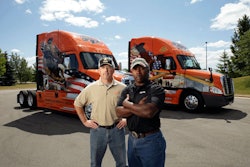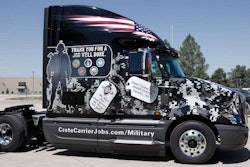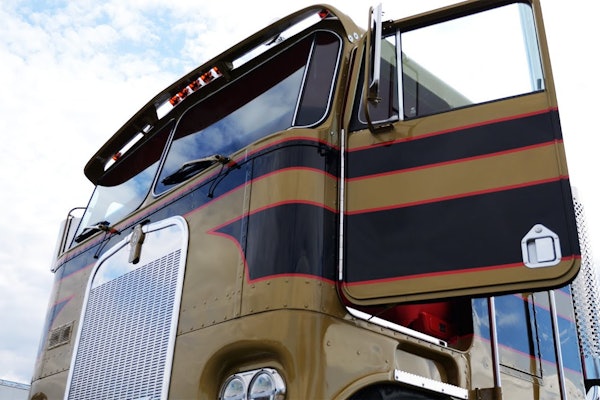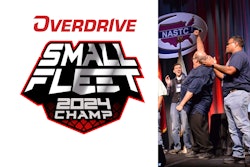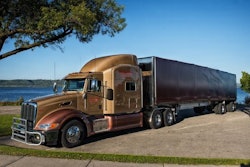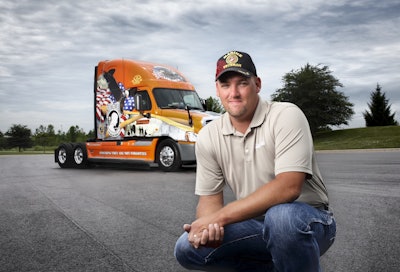 Marine veteran Jeff Edwards was chosen in 2011 to drive one of the Schneide Ride of Pride trucks. “It was like strapping back on the uniform,” he says.
Marine veteran Jeff Edwards was chosen in 2011 to drive one of the Schneide Ride of Pride trucks. “It was like strapping back on the uniform,” he says.Carriers are looking for a few good men – and women – to drive their trucks. Military veterans fill the bill.
As a Marine infantry unit leader serving in Iraq, Jeff Edwards’ mission was critical – and dangerous: providing security for the second tank battalion refuelers as they traveled from near Kuwait to the refineries in Baghdad.
“At the time you’re not really scared,” he recalls. “You’re secure in the fact that you’re going to do dangerous things but you know how they’re supposed to be done.”
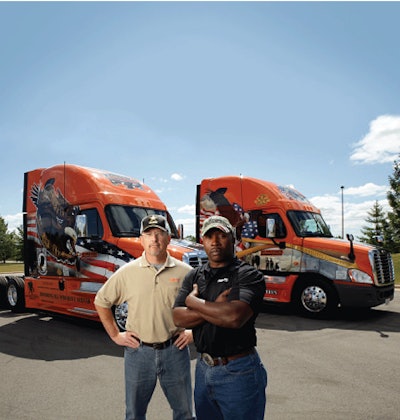 Russ O’Dell, left, and Greg Roberts are 20-year Army veterans who pilot the 2012 and 2011 Freightliner Ride of Pride trucks for Schneider National. The trucks travel the country appearing at events honoring our military.
Russ O’Dell, left, and Greg Roberts are 20-year Army veterans who pilot the 2012 and 2011 Freightliner Ride of Pride trucks for Schneider National. The trucks travel the country appearing at events honoring our military.Today, Edwards’ mission – delivering dry van and refrigerated freight on a dedicated run out of Dallas – is not nearly as hazardous, but he relies on the skills he developed during 13 years with the Marine Corps to complete it efficiently and safely. “Once you get your mission you’re on your own, so you have to have your initiative and discipline to get your loads delivered on time,” says the 37-year-old, who drives for Schneider National.
Edwards, who also piloted Schneider’s Ride of Pride truck, is one of thousands of Gulf War II Era veterans – those who served on active duty in the U.S. Armed Forces since September 2001 – who have chosen a career in trucking. In fact, of the 1.7 million Gulf War II Era veterans in the workforce, about 80,000 work in transportation and warehousing, which includes trucking, according to U.S. Bureau of Labor Statistics.
Percentage of military veterans in transportation and warehousing jobs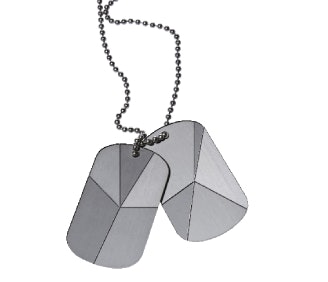 Age 18 to 34 — 9% 65 and older — 12% 35 to 44 — 16% 55 to 64 — 31% 45 to 54 –32% Combat Area WWII and Korea — 3% Other service period — 35% Vietnam — 32% Gulf War I — 19% Gulf War II — 13% |
Trucking welcomes veterans with open arms. The industry faces an estimated shortfall of nearly 100,000 qualified drivers, a number that could grow to nearly 250,000 by the end of 2013 with new hours of service rules. At the same time, returning veterans need work: The BLS estimates the unemployment rate for Gulf War II Era veterans at 12 percent, compared to the overall unemployment rate of 8 percent. For male veterans aged 18 to 24, it’s even higher – 29 percent, compared to 18 percent for the general population.
Veterans considering a move to trucking will get more than just a job, says Michael O’Connell, executive director of the Commercial Vehicle Training Association, a trade group representing about 200 truck driver training campuses nationwide.
He compares the prospects of someone becoming a truck driver with getting a four-year college degree. The college graduate “is not assured of getting a job,” he says, and if they do, the average nonscience starting salary is $37,800. Conversely, “if they go to truck driving school for as little as four weeks, they can start in an industry with high demand and start at $40,000,” he says.
Hire a vet? You bet!Federal and state governments, along with major trucking companies, have developed initiatives committed to filling trucking’s empty seats with military veterans. 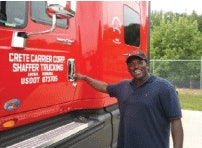 Under the Commonwealth of Virginia’s Troops to Trucks program, for example, the Department of Motor Vehicles recently certified two military installations as third-party testers to train personnel to operate commercial motor vehicles. Also, to make it easier for military CDL holders to transition to civilian driving jobs, the Virginia DMV will take advantage of a new federal regulation that waives the road skills test usually required to get a civilian CDL; applicants will still need to take the written exam. (More than 10 states waive the road skills test for military CDL holders.) Once veterans are trained and get their CDL, they are referred to at least three potential employers through a partnership with the Virginia Trucking Association. In the past, it was not always possible for veterans to use their military educational benefits to help defray the cost of truck driver training. But the 2011 VOW to Hire Heroes Act changed that, providing up to one year of benefits for veterans to pursue high-demand jobs, such as trucking. The legislation also gives companies that hire unemployed veterans a maximum tax credit of $5,600 per veteran or up to $9,600 for hiring veterans with service-connected disabilities. Schneider National and Werner Enterprises offer government-approved apprenticeship programs that allow veterans to use their military educational benefits for up to one year in addition to receiving a company paycheck. Similarly, Swift recently announced a program to provide 1,000 full scholarships to veterans to attend one of the four Swift Academies, with a one-year employment commitment. And many carriers also work with truck driving schools to reimburse a driver they hire for the cost of their schooling, says Michael O’Connell, executive director of the Commercial Vehicle Training Association. Military organizations are taking notice of carriers’ efforts. J.B. Hunt, Penske, Schneider National and Werner Enterprises were named to G.I. Jobs magazine’s list of the Top 100 military-friendly employers. In May, CivilianJobs.com, a site that connects military with civilian careers, honored Crete Carrier and Schneider National among its 2012 Most Valuable Employers for Military. And recently, the Employer Support of the Guard and Reserve presented the inaugural Extraordinary Employer Support Award to Schneider National. |
And that’s just the beginning. From there, drivers can move into regional or dedicated operations, or go on to own their own truck or even a fleet, O’Connell says.
From the carrier’s perspective, there are two primary reasons hiring veterans makes sense, says Mike Hinz, vice president of driver recruiting for Schneider National.
“First of all, there’s the patriotic ‘we owe it to the country’ aspect,” says Hinz, a former Army officer. Then there’s the return on investment. “Productivity, good judgment, staying safe, showing up to work on time – those fundamental attributes help us to be a better trucking company and help us to be competitive in a very competitive industry.” Currently 21 percent of Schneider’s hires are former military.
Crete Carrier Corp. sees the military as a fresh source of qualified drivers, says Jeff Dady, Crete driver development manager. “We had two options: hire out of schools or hire out of the military,” he says. “The military does so much to prepare individuals to deal with situations – adversity, attention to detail. We feel veterans make outstanding employees.”
To help attract more veterans, Phoenix-based Swift Transportation recently hired Saul Perez, a 21-year Marine Corps veteran, as its first military transitional liaison. “Our goal is to help veterans pursue successful careers,” Perez says.
Many carriers work with veterans organizations to contact driver candidates about employment even before they leave active service. And while experience driving a truck in the military is helpful, some veterans may need additional training, depending on the type of vehicles they operated while in the service.
But increasingly, military bases are able to do third party testing to estimate drivers’ skill sets before they apply for civilian jobs, Crete’s Dady says. Some bases in Virginia, for example, offer training to help personnel pursue civilian driving careers.
Crete driver David Payne wanted to continue to use his 19 years of experience driving truck in the Army when he retired after 23 years of service. “This transportation field is wide and needed,” says the Clarksville, Tenn., resident. “I decided to become a driver here because I love to travel.”
 |
After leaving the military in February, Payne met a member of his church who worked for Crete. “He gave me one of his cards and asked if it was all right for one of his recruiters to contact me. They called the next day,” Payne recalls. “Everything was quick and easy. I learned everything I needed to know.”
Even veterans with no prior driving experience seek out civilian truck driving jobs, Dady says. “We have individuals who’ve been in human resources, mechanics, engineers – all have become truck drivers.” Crete even has a driver who retired as a three-star general.
It’s the “love for trucks and travel,” Dady adds, that transcends prior experience and makes people want to pursue a driving career. Crete has 40 drivers who are former military. “Our goal is to quadruple that. We’d like to see 400 to 500 per year hired through this program.”
Schneider National provides a “continued career path for our heroes” by offering them the opportunity to become owner-operators, says Grailing Jones, with Schneider’s Small Business Owner-Operator Development Division. Once “vetrepreneurs” have been company drivers for Schneider for four months, they are eligible to own their own truck. Schneider provides the financing and helps mentor them in running a small business. “The maturity level and tenacity of individuals coming out of the military sets them a cut above” many owner-operator candidates, Jones adds.
William Dove didn’t intend to own a trucking business when he was separated from the Army in 2005 for medical reasons. He found work in computers, but when his employer suddenly closed, he decided to follow in his dad’s footsteps and go to driving school. After working for various carriers, he bought a 2005 Kenworth W900 and started American Veteran Xpress in 2010. Today, Dove’s company runs six trucks, one driven by his dad, pulling dry vans.
“Everyone who works for us is either a veteran or a close family member of a veteran,” Dove says. He wanted to create an environment where former military personnel would feel accepted. “Veterans understand veterans,” he says.
In many ways, the challenges veterans have faced make them uniquely qualified to be truck drivers, Schneider driver Edwards says. “We’re out on the road, which is a lifestyle we’re used to. We can usually handle it more than someone who’s been home all of their life,” he says.
Veterans considering careers in trucking should know that their new mission is critical, Schneider’s Hinz says. Trucking has a hand in everything from disaster relief to keeping the nation’s auto plants running on time. Much like in the military, he says, “you’re part of something bigger than you.”



